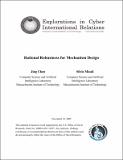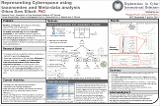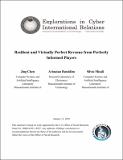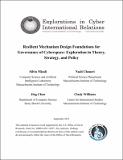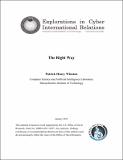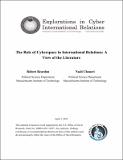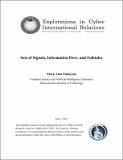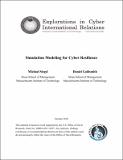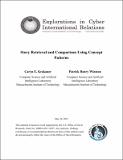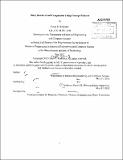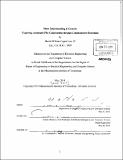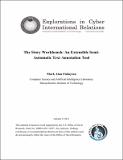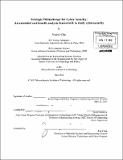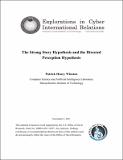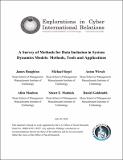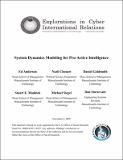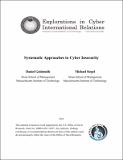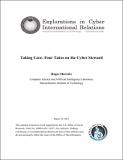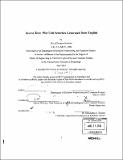Browsing Explorations in Cyber International Relations (ECIR) by Title
Now showing items 78-97 of 113
-
Rational proofs
(© Association for Computing Machinery, New York, NY, USA, 2012-05-19)We study a new type of proof system, where an unbounded prover and a polynomial time verifier interact, on inputs a string x and a function f , so that the Verifier may learn f (x). The novelty of our setting is that there ... -
Rational robustness for mechanism design
(© Massachusetts Institute of Technology, 2009-11-10)The currently prevailing equilibrium-based approach to mechanism design suffers from a plurality of fundamental problems, and new conceptual frameworks are needed to solve or sufficiently alleviate them. In this paper, ... -
Representing cyberspace using taxonomies and meta-data analysis
(Explorations in Cyber International Relations, 2011-12-07)Problem: Modeling and mapping the landscapes of emerging research fields, such as cyberspace. • Most research fields are composed of many subfields which are related in intricate ways, therefore structural organization ... -
Resilient and virtually perfect revenue from perfectly informed players
(© Massachusetts Institute of Technology, 2010-01-13)We put forward a new extensive-form mechanism that, in a general context with perfectly informed players and quasi-linear utilities, • Virtually achieves optimal revenue at a unique subgame-perfect equilibrium; • Is ... -
Resilient mechanism design foundations for governance of cyberspace: Exploration in theory, strategy, and policy
(© Massachusetts Institute of Technology, 2013-09)Three related trends in world politics – shifting in power relations, increased diversity of actors and entities, and the growing mobilization and politicization of global constituencies are contributing to a global “tussle” ... -
The right way
(© Cognitive Systems Foundation, 2012-01)I ask why humans are smarter than other primates, and I hypothesize that an important part of the answer lies in the Inner Language Hypothesis, a prerequisite to what I call the Strong Story Hypothesis, which holds that ... -
The role of cyberspace in international relations: A view of the literature
(© International Studies Association, 2012-04-01)This paper reviews the literature on cyber international relations of the previous decade. The review covers all journal articles on the role of cyberspace and information technology that appeared in 26 major policy, ... -
Sets of signals, information flow, and folktales
(© Springer-Verlag, Berlin, Heidelberg, 2012-06-01)I apply Barwise and Seligman’s theory of information flow to understand how sets of signals can carry information. More precisely I focus on the case where the information of interest is not present in any individual signal, ... -
Simulation modeling for cyber resilience
(© Massachusetts Institute of Technology, 2010-10)Identifying high-leverage intervention points to increase cyber resiliency—the ability to provide and maintain acceptable service levels in the face of challenges— requires identifying, integrating, and framing a diverse ... -
Story retrieval and comparison using concept patterns
(© The Association for Computational Linguistics, 2012-05-26)Traditional story comparison uses key words to determine similarity. However, the use of key words misses much of what makes two stories alike. The method we have developed use high level concept patterns, which are comprised ... -
Story retrieval and comparison using concept patterns
(Massachusetts Institute of Technology, 2012)To understand a new situation, humans draw from their knowledge of past experiences and events. For a computer to use the same method, it must be able to retrieve stories that shed light on a new situation. Traditional ... -
Story understanding in Genesis : exploring automatic plot construction through commonsense reasoning
(Massachusetts Institute of Technology, 2011)Whether through anecdotes, folklore, or formal history, humans learn the lessons and expectations of life from stories. If we are to build intelligent programs that learn as humans do, such programs must understand stories ... -
The Story workbench: An extensible semi-automatic text annotation tool
(© Association for the Advancement of Artificial Intelligence, 2011-10-09)Text annotations are of great use to researchers in the language sciences, and much effort has been invested in creating annotated corpora for an wide variety of purposes. Unfortunately, software support for these corpora ... -
Strategic philanthropy for cyber security : an extended cost-benefit analysis framework to study cybersecurity
(Massachusetts Institute of Technology, 2012)The international climate of cyber security is dramatically changing and thus unpredictable. As such, agile yet sustainable solutions are needed, along with an effective and a pragmatic evaluation framework to assess and ... -
The strong story hypothesis and the directed perception hypothesis
(© Association for the Advancement of Artificial Intelligence, 2011-11-03)I ask why humans are smarter than other primates, and I hypothesize that an important part of the answer lies in what I call the Strong Story Hypothesis, which holds that story telling and understanding have a central role ... -
A survey of methods for data inclusion in system dynamics models: Methods, tools and applications
(© The System Dynamics Society, 2014-07-20)Numerical data is experiencing a renaissance because 1) traditional data such as census and economic surveys are more readily accessible 2) new sensors are measuring things that have never been measured before, and 3) ... -
System dynamics modeling for pro-active intelligence
(© Massachusetts Institute of Technology, 2009-11-04)The Pro-Active Intelligence (PAINT) program, sponsored by the Intelligence Advanced Research Projects Activity (IARPA), was formed to address the challenges1 posed by distributed human networks, including terrorists and ... -
Systematic approaches to cyber insecurity
(© Massachusetts Institute of Technology, 2012)Recent developments have demonstrated that as the diffusion of cyber enabled technologies increases, so too does dependency on a cyber infrastructure susceptible to failure, outages, and attacks. While current efforts are ... -
Taking care: Four takes on the cyber steward
(Canada Centre for Global Security Studies (Canada Centre) at the Munk School of Global Affairs at the University of Toronto, 2012-03-18)Stewardship denotes a custodial, non-proprietary relationship to a resource or domain. The notion of a “cyber steward” resonates with those of us who regard cyberspace as a commons or domain that belongs to no one, and yet ... -
Text to Text : plot unit searches generated from English
(Massachusetts Institute of Technology, 2010)The story of Macbeth centers around revenge. World War I was started by an act of revenge. Even though these two stories are seemingly unrelated, humans use the same concept to draw meaning from them. Plot units, revenge ...


